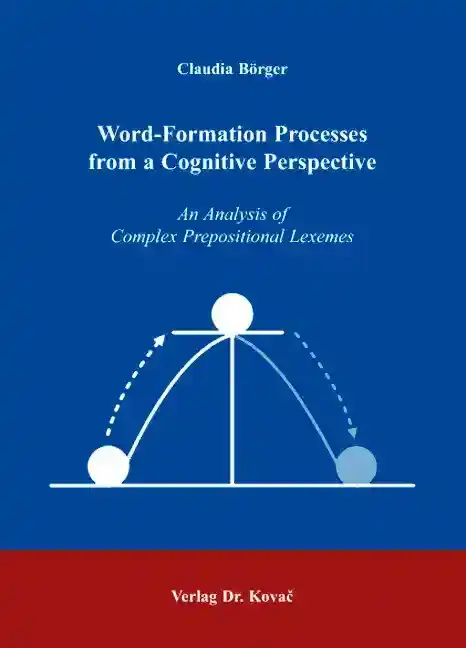Claudia BörgerWord-Formation Processes from a Cognitive Perspective
An Analysis of Complex Prepositional Lexemes
Mit CD-ROM
PHILOLOGIA – Sprachwissenschaftliche Forschungsergebnisse, Band 102
Hamburg 2007, 406 Seiten
ISBN 978-3-8300-3077-5 (Print) |ISBN 978-3-339-03077-1 (eBook)
Zum Inhalt
The COLLINS Cambridge International Dictionary of English illustrates the meaning of prefixed OVER with a contemporarys characterisation of American troops in Britain during World War II: Overpaid, overfed, oversexed and over here. The quote is well chosen - not just because of ist expressiveness. The meaning of OVER in these compounds in fact represents the meaning found with the vast majority of complex lexemes containing the preposition as a first constituent. In over-clumsy, overperfectly, over-standardisation, etc. OVER designates an exceeding of some upper scalar value with respect to the activity, state, or quality denoted by the second compound member. Due to the perceived inappropriateness of the exaggerated state of affairs, most of the instantiations share some kind of negative connotation.
OVER has received considerable attention within the cognitive literature. Most of the authors agree that it manifests a highly polysemous category. Since our corpus analysis of hapax legomena in the BNC reveals that it still productively participates in word-formation processes, the obvious question arises which part of the meaning potential the preposition is exactly exploiting when combined with other lexemes.
Assuming a central prepositional sense „surmounting of obstacle“, we will argue that the joint image-schematic transformation of both salient and less entrenched attributes motivates the use of OVER for encoding scalarity, while simultaneously blocking an analogous formation with related prepositions. The negative connotations associated with OVER+X instances can be attributed to a metaphorical causality mapping based on certain facets of our bodily experience.
Langackers (1987) conception of valence relations accounts for the fact that most adjectives lend themselves quite naturally for a combination with OVER, the second, autonomous constituent thereby elaborating a schematically present substructure within the first, dependent one.
Our findings reinforce two central claims of Cognitive Linguistics, one concerning the absence of full semantic compositionality, the other regarding the existence of general constraints on linguistic potential: Whereas the analysis of OVER+ADJECTIVE appears to be relatively straightforward, our findings regarding the semantic contribution of OVER as well as ist combination with other word classes clearly indicate that semantics, though motivated, is not predictable from the component structures. However, our investigation in terms of image-schematic transformations, inference-mapping, shared substructures, and cognitive salience provides some more evidence for the existence of general constraints that prevent an entirely unrestricted, subjective conception of language (analysis) in which ‘anything goes‘.
Schlagworte
Kognitive SemantikKonstruktionsschemataKonzeptuelle MetapherKorpuslinguistikPolysemiePräpositionPrototypensemantikSprachwissenschaftWord FormationWortbildungIhr Werk im Verlag Dr. Kovač

Möchten Sie Ihre wissenschaftliche Arbeit publizieren? Erfahren Sie mehr über unsere günstigen Konditionen und unseren Service für Autorinnen und Autoren.
